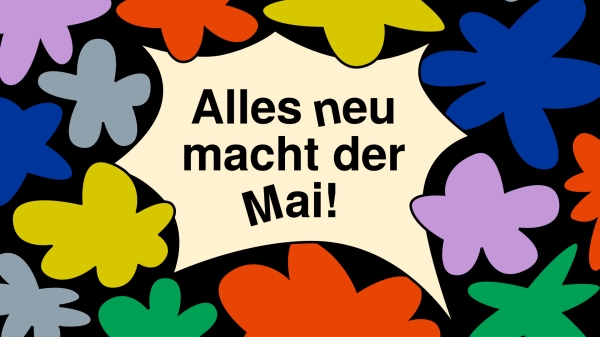Cultural policy over the last 50 years represents
an impressive success story. The increasing differentiation of support programs in the area of culture has also been able
to meet the needs of a growing society. The current array of crises that have been appearing, however, have brought the narrative
of a constantly expanding cultural sector to a close. This makes it all the more necessary to look for a new direction.
There are many reasons to want a restart for cultural policy on the structural level, one that would put the cultural
sector back into the center of things. Such a policy cannot be limited to simply preventing the worst, but must also—against
the reigning trend of exhaustion at rampant progress—point the way to a better future by setting convincing priorities.
Some components of a future orientation can already be seen in the increasing inclusion of new, seemingly extra-artistic
criteria in the genuinely artistic discussion of quality. These range from aspects of sustainability, resource utilization,
power of innovation, and urban development, including taking account of everything from social diversity to new forms of employment,
not least fair remuneration for those working in the cultural sector.
The strategical framework In many local authorities, cultural policy is in the process of strategically repositioning itself, redefining its goals,
and negotiating appropriate measures to implement this. A broader movement for planning cultural development has begun in
recent years to this end. Even large political authorities, such as the city of Vienna and the country as a whole, have begun
to organize cultural policy more strategically and according to more comprehensible priorities. In doing so they can point
back to certain exemplary attempts at a local and regional level, which have led in part to significant changes in the standing
of the cultural sector.
The event is meant to examine this development critically and above all to look into the question
of what this strategic orientation means for further development. Quite concretely for the participants of the symposium,
it means how they can affect this process and what they will have to adapt to.
At issue here is also the particular significance
of strategies in the area of culture, including questions of power. It asks about the responsibilities but also the possibilities
of participating, and looks into the anticipated effects on the cultural sector and those who work in it.
The
cultural sector as public sphere in a diverse society A second major theme of the event is the matter
of cultural public spheres. These evidence an increasing diversification of society, which has led to a diversity of cultural
forms of expression that can barely be fit into any overall understanding of cultural policy.
To an ever increasing degree,
the cultural sector can no longer count on a reliable core audience. Instead, it is necessary for cultural agents and institutions
to reposition themselves within each community and to function there as a site of exchange. The cultural sector can thus no
longer restrict itself to a representative function; it becomes a facilitator in community building.
The need to cooperate
more thoroughly in the future is not only evident within each individual sector. It is also necessary to collaborate with
representatives from related political fields in order to facilitate a new anchoring or relevance for the area of culture.
One strategic goal might be to facilitate collaboration with other social agents and interaction among various social groups,
thus attempting to reposition the cultural sector as a relevant factor in shaping “another future.”
Programm9:30 – 10:00
Welcome
Gerald Bast/ Rector of the University of Applied Arts
Michael Wimmer/ Researcher
in cultural policy
10:00 – 10:15
Introduction
Anke Schad-Spindler/ Researcher in cultural policy:
Strategies in Cultural Policy and New Publics
10:15 – 11:00
Marking Issues of Dispute
Milica Tomic/
artist
Ernst Schmiederer/ Blinklicht Media Lab
Heidrun Primas/ cultural worker
Zehra Baraçkılıç/ media artist
Uwe Mattheiß/ theater journalist
11:00 – 11:30
Break
11:30 – 13:00
Fish Bowl
– Plenum
Everyone gets talking! – Strategies for cultural policy as a response to a changing world for, by, and with
the cultural sector
13:00 – 14:00
Lunch break
14:00 – 14:15
Book presentation
by Anke Schad and Stefanie Fridrik “Konfliktuelle Kulturpolitik”
14:15 – 14:30
Impulse: Björn Johannsen/Agentur
Fishberg: Strategy and Culture
14:30 – 16:30
Working groups
- Relevance: What does cultural strategy
actually mean? And what does it mean for society? Moderation Aron Weigl
- Power: Who is responsible for developing cultural
political strategies? Who carries them out? Moderation Anke Schad
- Effect: How does implementing these strategies change
the cultural sector? Moderation Astrid Kury
- Participation: Who gets to speak? Moderation Ivana Pilić
16:30
– 17:00
Break
17:00 – 19:00
Final discussion “A Different Cultural Policy Is Possible”
The four reporters from the working groups
Christian Kircher/ Managing Director of Bundestheater Holding GmbH
Sybille
Linke/ Director of the Kulturamt Frankfurt am Main
Yvonne Gimpel/ Managing Director of IG Kultur
Veronika Kaup-Hasler/
City Councilor for Culture Vienna (unconfirmed)
Günther Riegler/ City Councilor for Culture Graz (unconfirmed)
Gerald
Bast/ Rector of the University of Applied Arts
Moderator: Michael Wimmer/ Researcher in cultural policy
Coordination
team and moderationAstrid Kury/ Akademie Graz
Ivana Pilić/ D/Arts
Anke Schad-Spindler/ Researcher
in cultural policy
Aron Weigl/ EDUCULT
Conception and overall moderation of the event
Michael
WimmerThe plenary parts of the events will also be streamed and will be available for later viewing.




